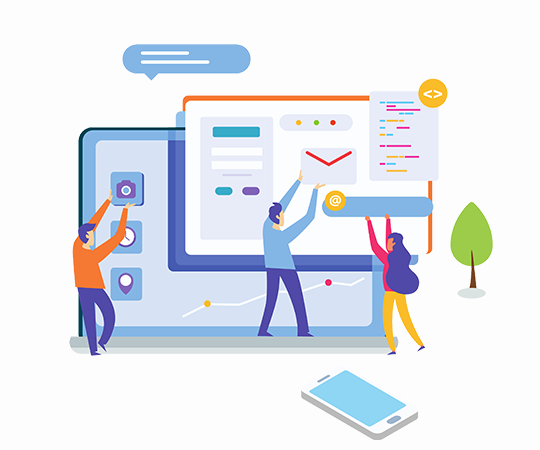Are you interested in becoming a Java Full-Stack Developer? Now is the perfect time to start your journey! As the demand for skilled and experienced software developers increases, so does the need for professionals with specialized skills. Becoming a successful Java Full-Stack Developer requires knowledge and experience in various areas, including coding, web development, database concepts, object-oriented programming (OOP), frontend technologies, and debugging and troubleshooting coding issues.
First and foremost, an understanding of the Java programming language is essential. You should be familiar with its syntax and structure, as well as its different libraries and frameworks such as Eclipse or Spring framework. Additionally, knowledge of web applications and development concepts is important, in order to create effective solutions that drive business results. Familiarizing yourself with HTML/CSS, JavaScript, JQuery, and AJAX will help you master front-end technologies used in web development projects. Similarly, an understanding of object-oriented programming (OOP) principles will also be required when developing applications using a combination of languages such as Java or C#.
Having an understanding of database concepts such as SQL and NoSQL databases will also come in handy when dealing with data storage solutions needed for web applications and websites. Database Administration knowledge, which helps maintain databases running smoothly by writing scripts and troubleshooting common issues that arise from poor database design or incorrect configurations, is equally important. Furthermore, mastering cloud computing concepts provides deeper insight into how platforms are designed to run on distributed systems, which can help optimize performance while keeping costs low by utilizing resources from multiple locations over networks using APIs provided by cloud providers like AWS or Azure.
Additionally, being able to debug code quickly can save lots of time when attempting to identify errors related to operating system configurations, hardware failures, application crashes, etc. Finally, familiarizing yourself with DevOps tools – Jenkins, Docker, Kubernetes – helps automate processes related to infrastructure management, while keeping up to date with industry trends keeps developers sharp, allowing them to make informed decisions when deciding which technologies to use during their projects.
What is the Work Environment Like?
Are you considering a career as a Java full-stack developer? If so, there are many important things to consider before embarking on this journey. From the roles and responsibilities of the job to salary ranges and work environments, it’s crucial to have an understanding of what you’re getting into. Are you looking to elevate your career as a full-stack developer? Look no further! Kelly technologies is now offering Java Full Stack Developer Course in Hyderabad
To understand what it takes to become a successful Java full-stack developer, we’ll start by examining common roles and responsibilities. As a Java full-stack developer, your job entails building web applications utilizing Java technologies. This includes understanding both front-end and back-end architecture to develop user interfaces, as well as coding software components. You should also be familiar with HTML/CSS to create web content or customize existing web designs. Additionally, knowledge of database systems such as Oracle MySQL or Microsoft SQL is essential when working with the full stack of any software application. Lastly, but most importantly, you must have the ability to troubleshoot complex technical problems while debugging code efficiently and quickly–all key skills needed for success in this role!
In terms of career growth potential, there are many avenues one can pursue as a successful Java full-stack developer–from working on more complex projects at larger companies or tech startups all the way up to taking lead/senior positions that involve mentoring junior developers or managing entire development teams! The possibilities become endless once you gain experience in this field, making pursuing it an exciting prospect.
When it comes specifically to Java developers, it’s no doubt that they have serious job security due largely in part because Java itself remains one of (if not) the most popular languages used today by businesses across multiple industries worldwide. This means that demand is likely to remain high over time, making careers involving Java development highly sought after by employers looking for experienced individuals who understand how to develop applications using Java technologies correctly!
Expectations for Java Full-Stack Developers in the Workplace
Interested in becoming a Java Full Stack Developer? This guide provides insight into what it takes to be successful in this role. A Java Full Stack Developer must have the ability to understand and utilize the latest technologies to develop robust applications. In addition, hands-on experience with web development using Java, an understanding of Application Programming Interface (API), and basic principles of software engineering are necessary.
To start, it is important to understand the basics of the Java programming language, including knowledge of various frameworks such as Spring and Hibernate, integrated development environment (IDE) such as Eclipse, web development tools like HTML and CSS, and databases such as MySQL. Industry best practices such as coding standards, code optimization, high scalability and reliability should also be followed.
As a Full Stack Developer, you can expect to develop efficient algorithms for maintaining data, implement design architectures for user interfaces, ensure complete compatibility with different platforms (web/mobile), provide accurate code reviews, and troubleshoot performance issues while developing applications. This highly sought after position offers the opportunity to work independently or on teams to create new sites or update existing ones, with salaries varying according to experience level.
How Much Do Java Full Stack Devs Earn?
Are you interested in becoming a Java Full Stack Developer? If so, then you’re in the right place! This guide provides an overview of what it takes to become a successful Java Full Stack Developer. It covers everything from the job requirements and qualifications to the typical salary range for this position.
First, let’s start with understanding what exactly a Java Full Stack Developer is. A full stack developer is any professional who can develop both front-end and back-end applications or services using various languages like HTML, CSS, JavaScript, and SQL. They’re also responsible for integrating these components into one cohesive product or service that works across all platforms. With that said, let’s dive into how to become a successful Java Full Stack Developer.
To begin your journey as a successful Full Stack Developer, you must first understand the job requirements and qualifications necessary to land these positions. You should have strong knowledge of programming languages, such as HTML5, CSS3, JavaScript, AJAX, jQuery, and SQL. Additionally, experience with frameworks such as AngularJS, familiarity with databases such as MySQL, excellent problem-solving skills, the ability to work well independently or within teams, proficient communication skills including verbal & written English, and proficient knowledge of web technologies (HTTP protocol) are necessary. Additionally, other programming language certifications may help you stand out from other potential candidates when applying for jobs in this field.
Now that we understand what it takes to be qualified for this role let’s talk about salary ranges within this industry. In general, Java Full Stack Developers can earn an average salary of $78,300 annually in the United States according to ZipRecruiter. However, salaries go up significantly based on experience level (beginner full stack software developers can make more than median annual salaries) as well additional training (such as degrees or certification specific languages), which helps increase earning potential – those with specialization may be able to earn even more than average given their expertise. Furthermore, growth in this industry is expected at a rate of 13% from 2019-2029 based on data provided by The Bureau Of Labor Statistics (BLS).
In addition to understanding the job responsibilities & qualifications associated with becoming a Java Full Stack Developer, you should also recognize that there are certain skills required for success like being organized & detail-oriented, having excellent problem-solving abilities, staying current on trends related technologies & tools, proficiency working independently, cross-functionally & within team environments, and creating development plans/roadmaps. Having these qualities alone will not only help ensure your success at the current position but will likely lead to greater opportunities down the line. Finally, don’t forget to stay prepared – create a personal development plan which outlines goals, steps needed, resources available, and take advantage of them. Doing so can help set frameworks to create a better future self!
Things to Consider When Seeking Salary as Java Full Stack Dev
Are you a Java Full Stack Developer seeking career advancement? When seeking salary as a Java Full Stack Developer, it’s important to consider the essential roles and responsibilities of the job and stay current with industry trends. By leveraging your experience and comparing different technologies used for development, you can highlight your skill set and negotiate for a competitive salary.
To stay on top of industry standards, research related jobs and stay knowledgeable about emerging technologies. The average annual salary for full stack Java developers in the United States is $78,300, but this may vary based on employer, experience level, and location. Comprehensive knowledge of HTML/CSS, a deep understanding of Java programming language and its frameworks, and mastery over front-end and back-end development are essential for success in this role. Strong problem-solving skills, communication, organization, and debugging abilities are also necessary. Thoroughly researching these topics prior to negotiating for a competitive salary can help maximize your earning potential and showcase your skill set during interviews and salary discussions with potential employers.




